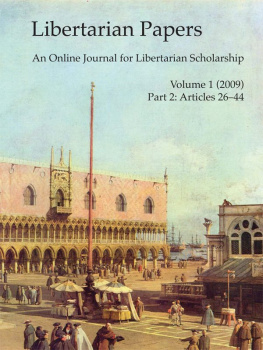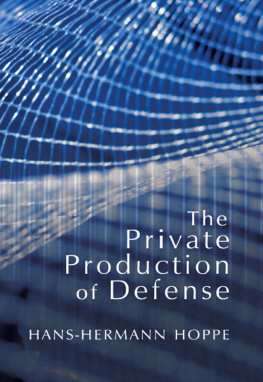Stephan Kinsella - Libertarian Papers, Vol. 1, Part 2 (2009)
Here you can read online Stephan Kinsella - Libertarian Papers, Vol. 1, Part 2 (2009) full text of the book (entire story) in english for free. Download pdf and epub, get meaning, cover and reviews about this ebook. year: 2011, publisher: BookBaby, genre: Romance novel. Description of the work, (preface) as well as reviews are available. Best literature library LitArk.com created for fans of good reading and offers a wide selection of genres:
Romance novel
Science fiction
Adventure
Detective
Science
History
Home and family
Prose
Art
Politics
Computer
Non-fiction
Religion
Business
Children
Humor
Choose a favorite category and find really read worthwhile books. Enjoy immersion in the world of imagination, feel the emotions of the characters or learn something new for yourself, make an fascinating discovery.
- Book:Libertarian Papers, Vol. 1, Part 2 (2009)
- Author:
- Publisher:BookBaby
- Genre:
- Year:2011
- Rating:3 / 5
- Favourites:Add to favourites
- Your mark:
- 60
- 1
- 2
- 3
- 4
- 5
Libertarian Papers, Vol. 1, Part 2 (2009): summary, description and annotation
We offer to read an annotation, description, summary or preface (depends on what the author of the book "Libertarian Papers, Vol. 1, Part 2 (2009)" wrote himself). If you haven't found the necessary information about the book — write in the comments, we will try to find it.
Libertarian Papers, Vol. 1, Part 2 (2009) — read online for free the complete book (whole text) full work
Below is the text of the book, divided by pages. System saving the place of the last page read, allows you to conveniently read the book "Libertarian Papers, Vol. 1, Part 2 (2009)" online for free, without having to search again every time where you left off. Put a bookmark, and you can go to the page where you finished reading at any time.
Font size:
Interval:
Bookmark:
MARK R. CROVELLI
Introduction
IN THE SIXTH CHAPTER of the justly celebrated book Human Action (1996), Ludwig von Mises laid the theoretical groundwork for what has since evolved into the accepted Austrian theory of probability. Indeed, virtually every discussion of the theory of probability by Austrian economists since the publication of Human Action has unswervingly adhered to the theory of probability propounded by Ludwig von Mises in this chapter.
For the development of his theory of probability, Ludwig von Mises drew heavily from the work of his brother, the positivist-mathematician Richard von Mises, who was one of the most outspoken proponents of what is known as the relative frequency or frequentist theory of probability. One of the most distinctive features of Richard von Misess frequentist theory of probability, which was also subsequently adopted by Ludwig von Mises, is the idea that numerical probabilities can only be calculated for what Richard von Mises called collectives (and Ludwig von Mises called classes) of repeatable events or phenomena (R. von Mises [1957] 1981, pp. 1112; L. von Mises 1996, pp. 10710).
This particular feature of both Richard and Ludwig von Misess respective theories of probability completely rules out the possibility of assigning probabilities to individual events or phenomena which cannot conceivably be assigned to a collective or a class, and for which, consequently, relative frequencies cannot possibly be calculated. Both Ludwig and Richard von Mises were acutely aware that their respective frequentist theories of probability completely ruled out the possibility of calculating probabilities for singular, non-replicable cases. As Richard von Mises writes:
When we speak of the probability of death, the exact meaning of this expression can be defined in the following way only. We must not think of an individual, but of a certain class as a whole, e.g., all insured men forty-one years old living in a given country and not engaged in certain dangerous occupations. A probability of death is attached to the class of men or to another class that can be defined in a similar way. We can say nothing about the probability of death of an individual even if we know his condition of life and health in detail. The phrase probability of death, when it refers to a single person, has no meaning for us at all. (R. von Mises [1957] 1981, p. 11, emphasis added)
Following the lead of his brother, Ludwig von Mises also claimed that singular, non-replicable events and phenomena, (instances of what he called case probability), are not open to any kind of numerical evaluation (L. von Mises 1996, p. 113).
It does not take any formal instruction in the philosophy of probability to recognize that the brothers von Mises are making a highly restrictive and exceptionally counterintuitive claim about the theoretical applicability of numerical probability. For, contrary to this claim of the brothers von Mises, most of us have encountered real world situations where numerical probabilities are assigned to future events which cannot conceivably be considered members of collectives or classes. As a rather mundane example, consider the determination of numerical betting odds for boxing matches. It very often happens in the sport of boxing that two fighters meet in the ring having never fought one another in the past. Since the fighters never fought in the past, any bout between two such boxers cannot be considered a member of a collective or a class which would allow the computation of any past relative frequencies of occurrence, let alone long-run relative frequencies of occurrence. As is well known, however, casinos and bookies do nevertheless assign numerical odds to these singular sporting events based upon indirect evidence (e.g., common opponents, injury reports, physical conditioning of the fighters, the fighters ages and weights, perceived psychological advantages and disadvantages of each fighter, venue, etc.), and their odds are astoundingly accurate most of the time. Indeed, if casinos were not able to consistently generate very accurate numerical odds for these singular events, they would very quickly find themselves bankrupt and out of business.
According to the brothers von Mises, however, the assignment of a numerical probability to a singular case such as a boxing match is totally inappropriate and meaningless. What are we to make of this? Are the numerical odds assigned by casinos and bookies to singular boxing matches (and other singular events and phenomena, like the 2008 presidential election) absurd or meaningless, simply because they are not derived from long-run frequencies of collectives or classes, as the von Mises brothers contend? If so, how can we explain the fact that casinos continuously generate such odds, and, more importantly, continue to make money year after year from wagers placed on the basis of those odds?
In this paper, I argue that Richard and Ludwig von Mises were mistaken to claim that numerical probabilities cannot be assigned to singular, non-replicable cases like boxing matches. I argue that Richard von Mises developed a demonstrably mistaken definition of probability, and that his mistaken definition inexorably led both von Mises brothers (and all Austrians who have followed their lead) to unduly proscribe the application of numerical probability to singular, non-replicable cases. Instead of defining probability in terms of purportedly objective long-run relative frequencies of collectives (as did Richard von Mises), I argue that consistent Austrians must define probability subjectively; that is, as a measure of our uncertainty about the likelihood of occurrence of some event or phenomenon, based upon evidence which need not derive solely from observations of past frequencies of collectives or classes.
The paper is organized as follows. In the first section that follows I offer an historical and analytical sketch of Richard von Misess frequentist definition of probability. In the second section that follows I attempt to reconstruct a proper and epistemologically defensible definition of probability that is radically different from that of Richard von Mises. I argue that the definition of probability necessarily depends upon whether the world in which we live is governed by time-invariant causal laws. In the third section that follows I argue that both the nature of human action and the relative frequency method for generating numerical probabilities demonstrate that the world is indeed governed by such time-invariant causal laws, and that this fact obliges us to adopt a subjective definition of probability. I conclude by arguing that if probability is defined subjectively, we need not condemn assigning numerical probabilities to singular, non-replicable cases.
Richard Von Misess Frequentist Definition of Probability
Richard von Misess developed his long-run frequentist definition of probability at a time when the definition and philosophical foundations for probability theory remained relatively undeveloped compared to most other branches of mathematics. As Harald Cramr describes the theoretical environment of the 1910s, the period in which Richard von Mises first developed his definition of probability:
There was no commonly accepted definition of mathematical probability, and in so far as there were any definitions at all, they were clearly inadequate for the numerous applications that were made in fields such as population statistics, molecular physics, and many others. Moreover, with few exceptions, mainly belonging to the French and Russian schools, writers on probability did not seem to feel under any obligation to conform to the standards of rigor that were regarded as obvious in other parts of mathematics. (Cramr, 1953, p. 658)
Font size:
Interval:
Bookmark:
Similar books «Libertarian Papers, Vol. 1, Part 2 (2009)»
Look at similar books to Libertarian Papers, Vol. 1, Part 2 (2009). We have selected literature similar in name and meaning in the hope of providing readers with more options to find new, interesting, not yet read works.
Discussion, reviews of the book Libertarian Papers, Vol. 1, Part 2 (2009) and just readers' own opinions. Leave your comments, write what you think about the work, its meaning or the main characters. Specify what exactly you liked and what you didn't like, and why you think so.












